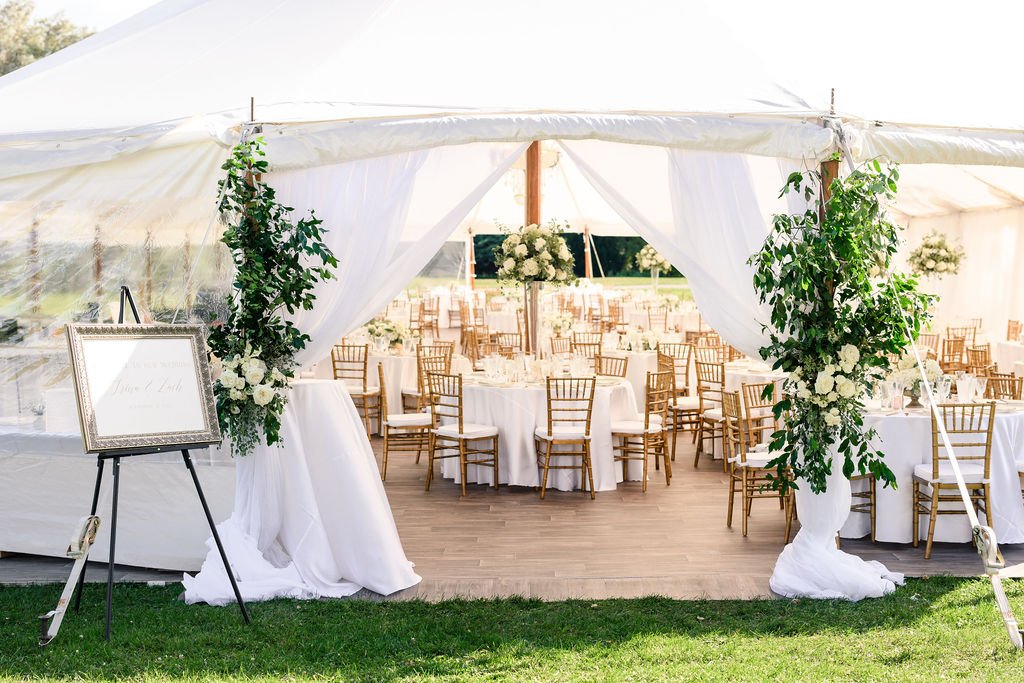When planning a tented wedding, you are essentially building a venue from the ground up! We’ve compiled this guide based on our past experience to ensure there are no surprises on your wedding day. Your first order of business should be to determine the layout and rental needs for the property. Typically a tent and rental company will come onsite to visit the property and assist with tent style, location, and size among other recommendations based on your needs. There are many factors when it comes to the size of the tent, such as estimated guest count, size and shape of the guest tables, dinner service style, bar location, dance floor size, etc.
Most rental companies will provide tents, tables, chairs, flooring, lighting, bars, etc. The rentals will likely be your largest expense for your wedding so securing these items right away will help you get a better idea of where to allocate the rest of your budget.
Other important items to consider are parking and transportation, lighting, restrooms, pest control, lawn care and landscaping, and weather.
Transportation and getting to the wedding:
Does your address appear on GPS and Google Maps?
Are there road conditions to consider in case of rain (potential low water crossings and alternate routes)?
Are roads and gates wide enough for shuttles to pass through? Are there any low hanging trees?
Do you have ample parking for guests and vendors and clear signage (and/or parking attendants and/or valet)?
Is there a place where shuttles can idle that is not in the way and is legal?
If parking on property is not an option, where will guests park and be shuttled to and from?
Property features to consider:
Lit, level, and trimmed paths (suitable for heels and elderly) to and from parking, bathrooms, catering area, etc.
Power, generators, and plenty of outlets and power cords that blend with décor but do not create safety hazards (Make sure the generators are full of fuel and that you have extra fuel on hand. Please test out the generators ahead of time.)
Even ground for underneath the dance floor
Lawn care: what needs to be handled ahead of time?
Pest control: Mosquitos, ants, snakes, varmints
Trash plan (who is providing the cans, bags, hauling away at the end of the night, etc.)
Rain and emergency plans - assure proper draining of event space pending rain
Create a Plan A, B, and C
Tent installation needs and lighting for when it gets dark
Temperature control: fans, heaters (tents require specific units for safety)
Permits (sound, alcohol, tent, parking, etc.- this varies by location)
Restroom/comfort stations
Catering needs - tent or covered area, access to power, access to restroom or handwashing station, lighting
Staging locations for decor, rentals, vendor’s items
General considerations for wind:
Keep in mind that paper items (programs, menus, escort cards, table numbers, signs, etc.) will likely blow away. We recommend using a seating chart rather than escort cards if possible or using something other than paper for escort cards (there are many creative ideas for this). Please use sturdy, heavy options for items such as easels, frames, table number stands, etc.)
Keep in mind that candles will likely not stay lit (even in slightly windy conditions).
We have planned and executed many tented weddings over the years so we know how important these components are to a seamless wedding day. We have also experienced very inclement weather as well - pouring rain, a tornado warning, and 50-80mph wind gusts on all separate occasions! Hiring a wedding planner to be the dedicated go-to person to handle not only the general wedding logistics but any inclement weather that comes along on the wedding day is highly recommended!







